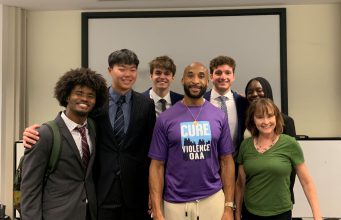
After the Marriage Equality Act passed on June 26, 2015, many people thought the legalization of same-sex marriage was the ultimate victory for LGBTQ people. For the LGBTQ Institute at the National Center for Civil and Human Rights, it was just the beginning. The Southeast is home to the majority of LGBTQ individuals in the U.S. Yet, the region is often the target of political agendas aimed at diminishing the civil rights of LGBTQ people.
In 2018, the LGBTQ Institute started surveying LGBTQ people in the South to glean unprecedented insights into their quality of life with a focus on access to health care, civic engagement and employment. They are preparing for another round of the survey and have partnered with Emory’s Goizueta Business School to develop and disseminate the survey and organize the data.
“The South receives the least amount of money for LGBTQ research, and we wanted to fill that gap,” says Ryan Roemerman, executive director of the LGBTQ Institute. “The goal is to create an infrastructure for community intervention resources and serve as a tool for activists and academics to work together.”
During the first survey, the LGBTQ Institute collected 6,502 responses from LGBTQ individuals living in 14 states, including: Alabama, Arkansas, Florida, Georgia, Kentucky, Louisiana, Mississippi, North Carolina, Oklahoma, South Carolina, Tennessee, Texas, Virginia and West Virginia. This year, they hope to increase that number.
“We hope to understand more about the daily life of LGBTQ people in the South, and how it might have changed over the last few years as the politics of the country have changed,” says Giacomo Negro, who teaches organization and management at Goizueta and serves as the principal investigator from Emory on the project.
Partnering on the survey aligns with Negro’s research on identity in the workplace. He’s studied how the presence of LGBTQ and LGBTQ-friendly businesses in cities and counties contributed to greater acceptance in society and helped to pass anti-discrimination ordinances. From the survey, he hopes to deduce how LGBTQ people feel about how affinity groups and resources in the workplace impact their experiences of work.
“The advantage of this survey is that it asks questions to individuals about identity, and this information is not accessible in Census-based data,” says Negro. “The survey will also allow us to explore employment outcomes when marginalized groups become less stigmatized than they have been in the past.”
He’s joined by Melissa Williams, associate professor of organization and management at Goizueta, who studies gender and diversity in the workplace, and PhD candidate Gabrielle Lopiano. The group has worked together on the survey methodology.
In addition to gleaning deeper insights, the survey has been modified to gather information about travel and COVID-19. The survey is also shorter, taking only 15 minutes from start to finish. Responses will be collected from June to October, in alignment with PRIDE Month and LGBTQ History Month.
This article by Kelundra Smith was originally featured on the Emory News Center.
Giacomo Negro is Professor of Organization & Management; Goizueta Term Chair, Organization & Management; Professor of Sociology (by courtesy). Read more about PhD candidate Gabrielle Lopiano here.










